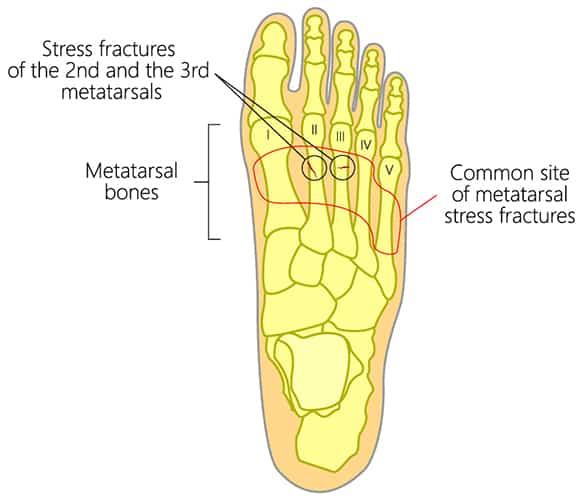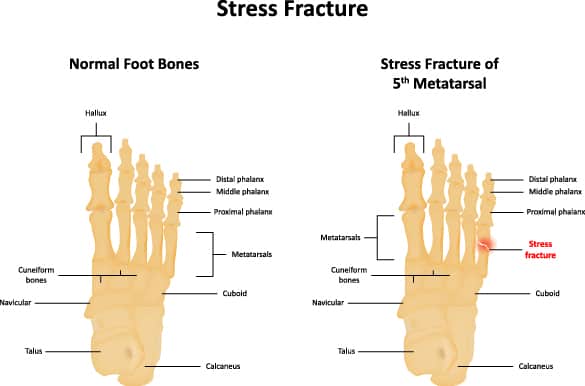
Caused by repetitive stress
A Stress Fracture is a break in a bone caused by repetitive stress, as opposed to trauma. It begins when a small crack appears in the cortex (outer shell) of the bone, which if left untreated may progress to a ‘through and through’ or overt fracture of the bone.
Stress Fractures can occur in any bone, but are quite common in the metatarsal bones of the foot, with the second and third metatarsals most commonly affected.
What are the Symptoms of Metatarsal Stress Fractures?
Symptoms of a metatarsal stress fracture include:
- sharp pain in the forefoot, aggravated by walking or weight bearing activities
- tenderness to pressure on the top surface of the foot
- diffuse swelling over the top of the forefoot
- aching pain which may persist even at rest or at night
There is often no recollection of injury, and you may simply develop a painful forefoot after some activity, such as walking, running, or high impact sports.


Which Factors Contribute to Metatarsal Stress Fractures?
There are many factors that contribute to the development of a metatarsal stress fracture, including:
- medical conditions, such as osteoporosis and diabetes, which may result in decreased bone density
- unusual stress on the metatarsal bone due to another forefoot deformity, such as a bunion
- abnormal foot structure or function, such as a flat foot or a high-arched foot
- increased levels of activity, especially without proper conditioning and insufficient rest between workouts (too much, too soon)
- inadequate footwear for your exercise activity, such as inadequate shock absorption on a hard surface.
If you suspect you have a stress fracture, it is important that you seek professional assessment and treatment, as there are many other causes of foot pain and swelling related to exercise. Your Podiatrist may require x-rays and diagnostic bone scans in order to determine the exact nature of your injury.
What is the Treatment for Metatarsal Stress Fractures?
Depending on the nature of your injury, your treatment may include:
- icing the top surface of the forefoot to reduce swelling
- rest from aggravating activities
- a cast or walking brace to immobilise your foot while the fracture heals
- orthopaedic taping and padding to relieve stress from the metatarsals
- footwear assessment and advice on more appropriate footwear for your feet and your activities
- custom prescription orthotics to avoid future recurrence of the injury
- a gradual return to exercise activities once the injury has healed
- If you suspect you may have a stress fracture, or are suffering from any exercise-related foot pain and swelling, contact us.
If you suspect you have a stress fracture, it is important that you seek professional assessment and treatment, as there are many other causes of foot pain and swelling related to exercise. Your Podiatrist may require x-rays and diagnostic bone scans in order to determine the exact nature of your injury.


